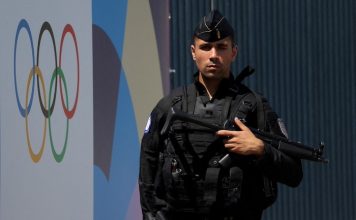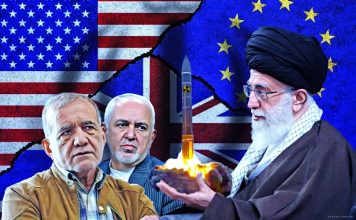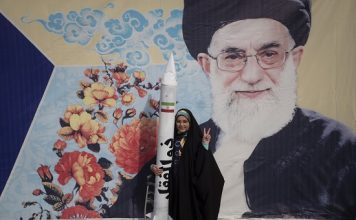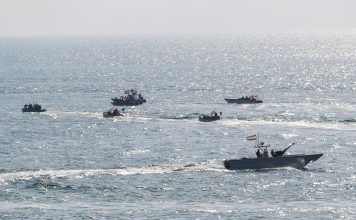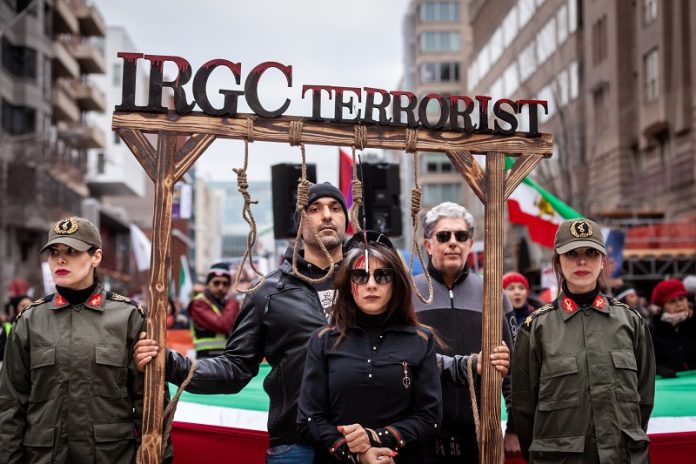
Seven Iranian-born attorneys based in France have signed a letter on June 9 indicating that the European Union can designate Iran’s Islamic Revolutionary Guards Corps (IRGC) as a terrorist organization without delay, and without having to secure a court ruling first.
In the letter, seen by Kayhan Life, the attorneys said that legal provisions — including a key piece of legislation known as “Common Position 931” enacted by the EU —enabled the EU to proscribe the IRGC right away. Under current laws, the EU could use official designations of the IRGC by non-EU countries to blacklist the organization, the lawyers argued.
[aesop_document type=”pdf” src=”https://kayhanlife.com/wp-content/uploads/2023/06/EN_-_DEF_-_Rapport_CGRI_-_EU_Terror_List_09062023.pdf” title=”The 22-page report” download=”off”]
The 22-page report was sent to the heads of all 27 EU member states, as well as to Josep Borrell Fontelles, the High Representative of the EU for Foreign Affairs, and to Crown Prince Reza Pahlavi. The letter was written by criminal defense lawyer Sahand Saber, and signed by Saber, Hirbod Dehghani-Azar, Prosha Deghani, Shaparak Saleh, Reihaneh Noveir, Sina Hazeghi and Saeid Abedi.
A group of French-Iranian lawyers in contact with my Secretariat, has produced a report attesting that there are no legal obstacles to adding the Islamic Revolutionary Guard Corps (IRGC) to the EU list of terrorist organizations.
Based on this report, already shared with…
— Reza Pahlavi (@PahlaviReza) June 10, 2023
[aesop_image img=”https://kayhanlife.com/wp-content/uploads/2023/01/2022-06-25T121255Z_512061779_RC20ZU98VJ9Z_RTRMADP_3_IRAN-NUCLEAR-BORREL.jpg” panorama=”off” credit=”FILE PHOTO: Josep Borrell attends a joint news conference, in Tehran, Iran June 25, 2022. REUTERS./” align=”center” lightbox=”on” captionsrc=”custom” captionposition=”left” revealfx=”off” overlay_revealfx=”off”]
The IRGC controls the country’s security, economic and foreign policies, and has been implicated in several lawsuits in the US and Canada involving acts of terror around the world. The US designated the IRGC as a terrorist organization in April 2019. Terrorist designations enable states to try to restrict terror-related activity by blocking assets belonging to targeted individuals and groups.
Responding to a Feb. 16 request by 30 European lawmakers to proscribe the IRGC, Borrell said on April 5 that what was needed was a “national decision by a competent national authority of a member state or a third country, such as a court decision or an order by an administrative authority.”
“The IRGC is not recognized as a legal entity by the EU courts, so it cannot be brought to trial,” Saber, one of the lawyers, told Kayhan Life. “Under such circumstances, the EU and its member states can substitute a judicial decision with any number of decisions reached elsewhere. There are no legal obstacles to proscribing the IRGC as a terrorist organization. The only issue now is the political will to do so.”
“The hesitation of countries in general, not just the EU, is that they don’t want to have bad relations with the Islamic Republic, in order to keep their political, economic and trade activities with the regime. We have to convince them that the best way to put an end to the regime is to support opposition movements,” Saber said.
ANALYSIS: Why Europe Is Unlikely to Designate IRGC As Terrorist Group
In its conclusion, the letter said that any resumption of talks by the US and the UK with Iran over the 2015 nuclear deal, and any sanctions lifted on Iran, “would strengthen the IRGC, and thus the repression of the millions of Iranian citizens who have been mobilized to defend their rights since mid-September 2022.”
Nationwide anti-government protests in Iran erupted in September, following the death of 22-year-old Kurdish-Iranian Jina Mahsa Amini. Amini was detained by Iran’s morality police, accused of violating the country’s mandatory hijab law, and died of head injuries she sustained while in custody. Iran’s security forces have responded to the protests with violent crackdowns which have left at least 500 people dead, including 70 children.
The argument that the EU can designate the IRGC as a terrorist organization using “Common Position 931” was also made by Matthew Levitt, the director of the Reinhard program on counterterrorism and intelligence at Washington-based think tank, the Washington Institute, in a Jan. 30 report. “There is no shortage of evidence—all admissible under the rules underpinning the EU terrorist designation process—to support designating the IRGC as a terrorist group,” Levitt said.
Lawmakers in the UK have asked the British government to blacklist the IRGC several times in recent months. Politicians representing the UK’s Conservative, Labour, Liberal Democrat and Scottish National parties called on the government to proscribe the group during a June 7 debate in the British Parliament. Officials familiar with the matter said the UK Home Office was nervous about the impact of a designation on British-Iranians in the UK, in a Jan. 16 report published by the Financial Times.
A previous request set out in a cross-party resolution to proscribe the IRGC was passed by a unanimous Jan. 12 vote in the UK House of Commons. The resolution was not binding and did not require the government to enact a designation.
The European Parliament urged the EU to proscribe the IRGC on Jan. 18, in a resolution backed by 598 lawmakers. Nine members voted against, and 31 abstained. The text asked for the designation against the IRGC, “in the light of its terrorist activity, the repression of protesters and its supplying of drones to Russia.”
Iran Is Paying ‘Political and Diplomatic Price for Its Brutality,’ UK Official

